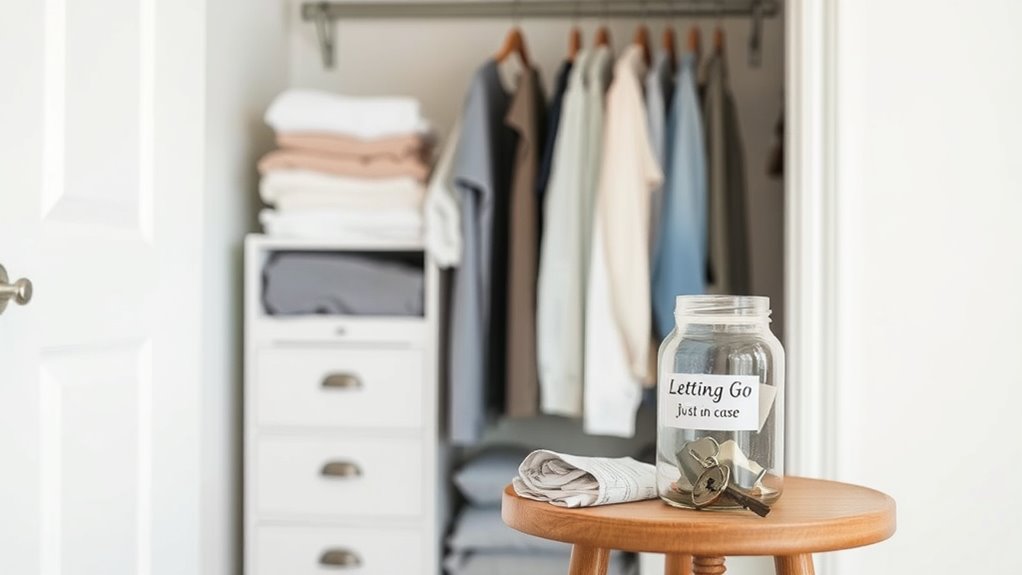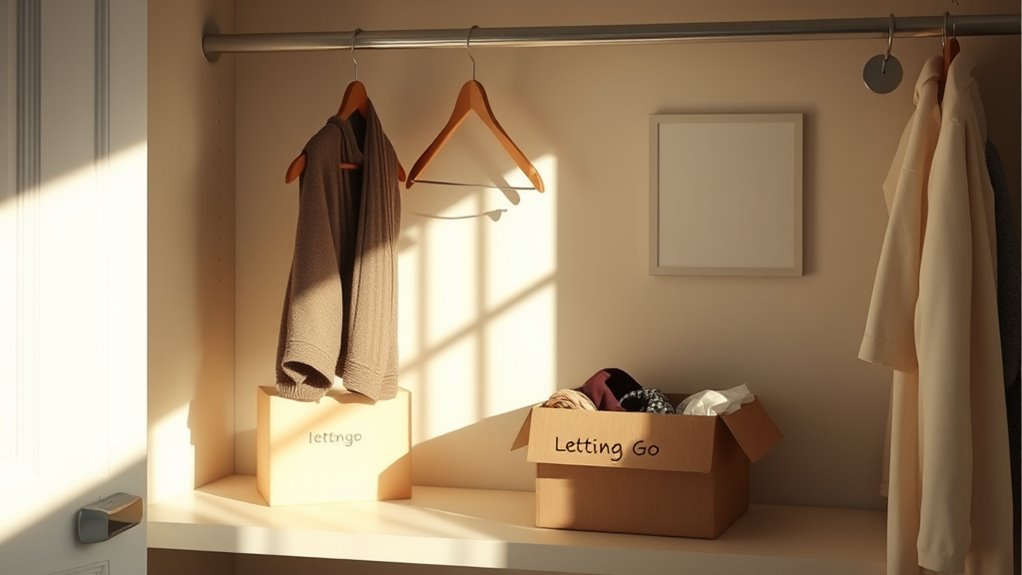The surprising psychology behind letting go of “just in case” items lies in emotional attachments rooted in feelings of safety, memories, and control. You often cling to these objects because they symbolize reassurance, making it hard to part with them without feeling guilty or insecure. These attachments are more about your emotions than practicality. To better understand how to manage this, explore how your feelings influence your decisions and discover ways to release these burdens more easily.
Key Takeaways
- Emotional bonds to “just in case” items often stem from feelings of safety, memories, or control rather than practical need.
- Letting go triggers fears of loss or regret, creating internal conflict between rationality and emotional attachment.
- Overvaluing these items amplifies their perceived importance, making decision-making more difficult.
- Reframing decluttering as a positive step can reduce guilt and promote emotional freedom.
- Understanding the symbolic meaning behind attachments helps differentiate genuine needs from emotional habits.

Many of us hold onto “just in case” items, believing they’ll come in handy someday, but this habit often stems from underlying fears of uncertainty and loss. When you cling to these objects, it’s not just about practicality; it’s about emotional attachment. You might find yourself reluctant to let go because these items symbolize safety, memories, or a sense of control. This emotional bond makes the decision to discard feel like losing a part of yourself, which triggers discomfort or even guilt. Your decision-making processes become tangled in these feelings, often leading you to prioritize emotional comfort over rational judgment.
When you attempt to declutter, your mind may debate fiercely. On one side, you recognize that holding onto everything creates clutter and stress. On the other, your emotional attachment whispers that you might need that item someday, or that letting go means risking regret. This internal conflict is rooted in how your brain processes emotional attachments—they’re not just objects but extensions of your experiences or fears. The decision to let go becomes less about practicality and more about managing these deep-seated feelings. You might worry that discarding something will diminish your sense of preparedness or evoke feelings of insecurity. These fears reinforce your attachment and make it harder to see the situation objectively.
Understanding your decision-making processes helps you realize that the emotional weight you assign to “just in case” items is often disproportionate to their actual utility. Your brain tends to overvalue items that evoke positive memories or represent safety, even if they’re no longer relevant. Recognizing this can be a powerful step toward change. Instead of viewing the act of letting go as a loss, consider it an opportunity to reclaim mental space and emotional freedom. It’s about shifting your perspective from what you might lose to what you stand to gain—clarity, peace, and a sense of control over your environment.
A helpful insight from psychology indicates that emotional attachment to objects can be linked to our need for security and comfort. The key lies in consciously examining your emotional attachment. Ask yourself why holding onto this item feels so important. Is it really about the object, or about what it represents? By addressing these underlying feelings, you can better navigate your decision-making processes. Over time, you’ll learn to differentiate between genuine needs and emotional habits. Letting go becomes less about losing and more about freeing yourself from unnecessary burdens. It’s a gradual process, but understanding the emotional and psychological roots of your attachments empowers you to make choices that serve your well-being, rather than fear.
Frequently Asked Questions
Why Do Some People Find It Harder to Let Go of “Just in Case” Items?
You might find it harder to let go of “just in case” items because they often hold sentimental value, reminding you of past experiences or loved ones. Additionally, the fear of deficiency or not having enough can make it tough to discard these items, as you worry about future needs. This emotional attachment and concern about scarcity keep you holding on, even when the items no longer serve a practical purpose.
Can Emotional Attachment Influence the Decision to Keep or Discard Items?
Your emotional attachment to items can considerably influence whether you keep or discard them. Strong emotional bonds create a sense of attachment security, making it harder to let go. When you associate objects with memories or feelings, you may fear losing that connection. This emotional significance can override practical considerations, leading you to hold onto items that no longer serve a purpose but provide comfort or a sense of security.
How Does Fear of Future Uncertainty Impact Clutter Accumulation?
Imagine you’re stuck in a never-ending episode of “Twilight Zone,” feeling overwhelmed by future anxiety. Fear of future uncertainty fuels clutter accumulation because you think holding onto items provides safety. This triggers decision paralysis, making it hard to declutter. You cling to “just in case” items, believing they’ll serve you someday, but in reality, this fear keeps you trapped in a cycle of clutter and stress.
Are There Psychological Benefits to Decluttering “Just in Case” Belongings?
You might find that decluttering “just in case” belongings offers psychological benefits, such as reduced stress and increased clarity. When you let go of unnecessary items, your mind feels lighter, and your motivation shifts from fear of the unknown to a sense of control. These decluttering motivations help you create a more organized space, boosting your overall well-being and making it easier to focus on what truly matters.
What Strategies Help Overcome the Guilt of Discarding These Items?
Ever wonder how to beat guilt when discarding “just in case” items? To overcome this, practice guilt alleviation by reminding yourself of your decision-making confidence and the benefits of decluttering. Set clear goals and boundaries, and trust your judgment. Visualize the positive impact of a clutter-free space. These strategies help you feel more confident, reduce guilt, and reinforce your control over what you choose to keep or let go.
Conclusion
So, when you finally let go of those “just in case” items, you’re not just decluttering—you’re releasing a superpower. Imagine freeing yourself from an invisible, heavy backpack filled with worries and “what ifs.” Suddenly, you’re lighter than a feather, faster than a cheetah, and more in control than a captain steering through a storm. Embrace the art of letting go, and watch your life transform into a thrilling adventure, unburdened by the weight of unnecessary clutter!









